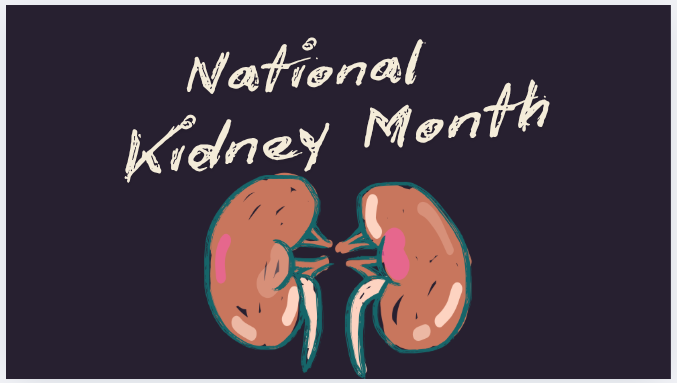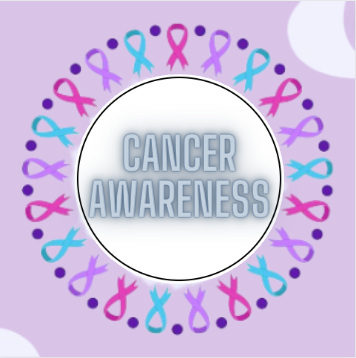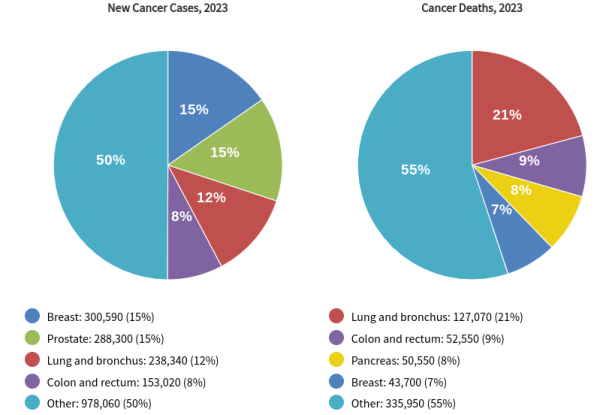Did you know that February is National Cancer Prevention Month? It is estimated that one in two people will be diagnosed with cancer at some point in their life. The American Cancer Society says, “In 2023, a little over 1.9 million new cases of cancer are expected to have been diagnosed in the United States.” Today, I will talk about the most common cancers diagnosed, how to decrease your chances of cancer, and how to catch cancer at an early stage. Cancer is the number two killer in the world, behind cardiovascular disease.
For women over the age of eighteen, the most common cancer is breast cancer, however, it is said that lung cancer is the deadliest. Other common cancers in women include skin, breast, lung, colorectal, and uterine. For men over the age of eighteen, prostate cancer is the most common. The most commonly diagnosed in general, according to the National Cancer Institution, is breast cancer. The National Cancer Institution says, “Lung and bronchus, colorectal, pancreatic, and breast cancers are responsible for nearly 50% of all deaths.”
Every type of cancer has its own set of risk factors and possible causes. Sometimes, there is just no way to avoid getting diagnosed, but catching cancer at an early stage is the best possible scenario upon being diagnosed. Genetics can play a huge part in the development of cancer, but there are many other factors that can increase your chances.
Tobacco plays a major part in cancers, especially lung cancer. When smoking tobacco, around 70 different chemicals go into your lungs. After going into your lungs, it reaches your bloodstream and travels around your whole body. When those chemicals go into your lungs, tar forms in your lungs and causes not only lung cancer but also other respiratory diseases such as emphysema. The smoke causes DNA cells in your body to have a hard time healing and repairing itself. If you have a buildup of damaged DNA cells then, as explained by Cancer Research UK, “The build-up of DNA damage in the same cell over time leads to cancer.” Chewing tobacco causes DNA damage in your mouth, which can lead to oral cancer, tooth decay, gum disease, and tooth loss.
Another thing that can lead to cancer is drinking alcohol. Cancer Council Victoria states, “There is strong evidence that drinking alcohol increases people’s risk of cancers of the female breast, liver, mouth, throat (pharynx and larynx), esophagus and bowel. Heavy drinking may also increase people’s risk of stomach cancer.” Liver cancer is the most common cancer caused by drinking. This is because the liver filters out toxins and waste from the blood. If you heavily or frequently drink, the liver gets worn. It isn’t designed to process too much, so if it has to overprocess frequently the liver will become damaged. Damaged cells are what lead to cancer.
Having and maintaining a healthy diet/ weight also helps to reduce your risks. Mayo Clinic demonstrates this by saying, “Although eating healthy foods can’t ensure cancer prevention, it might reduce the risk. Consider the following:
- Eat plenty of fruits and vegetables. Base your diet on fruits, vegetables, and other foods from plant sources — such as whole grains and beans. Eat lighter and leaner by choosing fewer high-calorie foods. Limit refined sugars and fat from animal sources.
- Limit processed meats. Eating processed meat often can slightly increase the risk of certain types of cancer. This news comes from a report from the International Agency for Research on Cancer, the cancer agency of the World Health Organization.
People who eat a Mediterranean diet that includes extra-virgin olive oil and mixed nuts might have a reduced risk of breast cancer. The Mediterranean diet focuses mostly on plant-based foods, such as fruits and vegetables, whole grains, legumes, and nuts. People who follow the Mediterranean diet choose healthy fats, such as olive oil, over butter. They eat fish instead of red meat.
Being at a healthy weight might lower the risk of some types of cancer. These include cancer of the breast, prostate, lung, colon, and kidney. Physical activity counts too. Besides helping control weight, physical activity on its own might lower the risk of breast cancer and colon cancer. Doing any amount of physical activity benefits health. But for the most benefit, strive for at least 150 minutes a week of moderate aerobic activity or 75 minutes a week of hard aerobic activity. You can combine moderate and hard activities. As a general goal, include at least 30 minutes of physical activity in your daily routine. More is better.”
Another thing that contributes to cancer risks is the sun. The sun gives off UV radiation that can burn our skin (Sunburn). When our skin is damaged by the sun, our DNA cells start to develop in unusual patterns causing skin cancer. The best way to prevent skin cancer is to use sunscreen. Anna Lien-Lun Chien, M.D. at Johns Hopkins Medicine recommends, ” For day-to-day use, pick a sunscreen with an SPF of at least 30. If you spend time outdoors, choose a product with SPF 60 or greater. In reality, most people do not use as much sunscreen as they should, and this higher SPF helps compensate for the reduced application.” If you are outside swimming or sweating, doctors recommend reapplying sunscreen every two hours. Some makeup products claim to have SPF, but it isn’t strong enough to do much of anything. Even if it did have a high SPF rating, you would need to wear a lot of makeup on your entire face.
If diagnosed with cancer, the best case scenario is that it’s been caught early. When caught and treated early, treatments are more effective and you have a higher chance of becoming cancer-free. Mayo Clinic suggests, “Doing regular self-exams and having screenings for cancers — such as cancer of the skin, colon, cervix, and breast — can raise the chances of finding cancer early. That’s when treatment is most likely to succeed.” Having regular check-ups and tests can find cancer in the early stages. Some people don’t go to the doctor until they have symptoms, but by then it can already be too late or in the higher stages. Sometimes, people can go a long time without any symptoms. It’s better to be safe, rather than sorry! If you have any questions some reliable websites have been linked below!!!
https://www.mayoclinic.org/healthy-lifestyle/adult-health/in-depth/cancer-prevention/art-20044816
https://www.cdc.gov/cancer/dcpc/prevention/index.htm












